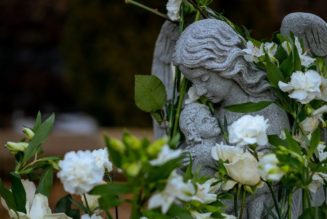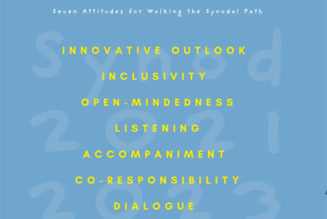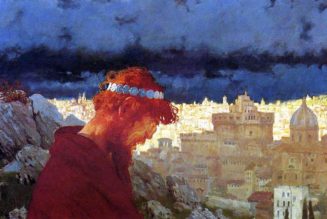5 Minute Read
“At first the beauty of the melodies and of the interwoven words in elven-tongues, even though he understood them little, held him in a spell, as soon as as he began to attend to them. Almost it seemed that the words took shape, and visions of far lands and bright things that he had never yet imagined opened out before him; and the firelit hall became like a golden mist above the seas of foam that sighed upon the margins of the world. Then the enchantment became more and more dreamlike, until he felt that an endless river of swelling gold and silver was flowing over him, too multitudinous for its pattern to be comprehended; it became part of the throbbing air about him, and it drenched and drowned him. Swiftly he sank under its shining weight into a deep realm of sleep.”
(The Fellowship of the Ring, Frodo at Rivendell, pg. 233)
Power of Beauty
This passage from The Lord of the Rings displays the capacity of Beauty (in particular beautiful music) to lift us out of ourselves into the Eternal. In this example, Frodo is enchanted and feels as if he has been transported to another realm. Beauty has the ability to take us out of ourselves, out of the mundane reality of life, into a place beyond ourselves. In a culture that continually tries to make us believe there is nothing beyond the confines of this world, Beauty has a particular role in leading us to our true home of Heaven.
For Saint Augustine, Beauty had the added power to change a person. In his own life, his experience of Beauty eventually led him to break away from his past life of sin and to start anew,
“Late have I loved you, beauty so old, and so new: late have I loved you. And see you were within, and I was in the external world and sought for you there. I was deformed, drowning in those fair forms you made. […] You called. You shouted. You battered my deafness. You shone. You glistened. You shattered my blindness. You radiated and I breathed in your spirit, and I desired you. I tasted you and hungered, thirsted after you. You touched me and I burned for your peace.”
St. Augustine, Confessions, trans. Henry Chadwick (New York: Oxford University Press, 1991), 201.
Power of Music
In particular, Augustine affirms the role that beautiful music has in leading us to the Eternal,
“Music, that is the science or the sense of proper modulation, is likewise given by God’s generosity to mortals having rational souls in order to lead them to higher things.”
Epis. 161. De origine animae hominis, 1, 2; PL XXXIII, 725.
It is a gift given to Men and one that is more powerful than mere words. Speaking about the power of music over simple recitation of words, he says,
“I feel that our souls are moved to the ardor of piety by the sacred words more piously and powerfully when these words are sung than when they are not sung, and that all the affections of our soul in their variety have modes of their own in song and chant by which they are stirred up by an indescribable and secret sympathy.”
St. Augustine, Confessions, Book X, chap. 33, MPL, XXXII, 799ff.
Augustine’s writing about the power of music seems to echo Frodo’s experience in Rivendell and shows that beautiful music has a particular capacity to change something within us and lead us to God.
Beauty of Creation
The beauty of creation can also have a great ability to open up the heart of man to belief in a creator. Saint Augustine affirms this effective tool of catechesis when he poses the challenge,
Question the beauty of the earth, question the beauty of the sea, question the beauty of the air distending and diffusing itself, question the beauty of the sky. . . question all these realities. All respond: “See, we are beautiful.” Their beauty is a profession [confessio]. These beauties are subject to change. Who made them if not the Beautiful One [Pulcher] who is not subject to change?
The beauty of creation is seen in the eyes of faith as a “profession” of the existence of God, of the One who created all the beauty that we see.
This is closely related to what many people call the “design argument,” whereby a person sees the beauty, order and design of creation and thinks to themselves that “there must have been Someone behind this all.”
Stargazing and Atheism
An interesting theory that I have heard from various people is that atheism started to spread more rapidly with the introduction of the street lamp. This began in the early 19th century and started what we know today as “light pollution.”
When we look up at the sky, we no longer see the beauty of the stars. Instead, we are lucky if we see a dozen stars or any stars if we live inside the city.
The reason why this is linked with atheism is because even the pagans of old looked up at the vast array of stars in the sky and thought they were gods. They knew that there was something beyond themselves and thought the tiny specks of light they saw were celestial powers that governed the earth.
It is an interesting theory, one that I encourage all of us to test out. Drive outside of the city limits after nightfall on a clear day and find “the middle of nowhere.” Stop, turn your car’s lights off and look up.
If you want to know the best places to go for the most beautiful night sky, check out this website which has a map of the world that highlights the best places for a pure dark sky. Or you can visit these places in the US that are known for its beautiful nighttime view. There is even an association that rates each national park on how well you can see the nighttime sky.
Now obviously there are many scientists who study the sky and remain firm in their atheism. However, they do that when they divorce beauty from the truth. That is why when we stargaze or take people to do the same, we must always wed beauty and truth together.
Also, I would say the vast majority of people, when taken out to see the beauty of the stars, would have a reaction of awe and wonder rather than one of scientific curiosity.
Beauty will Save the World
We have seen that Beauty can play a large role in society. Beautiful music can change us and urge us to live our life united to God and the beauty of creation can urge us to ask who created it.
In a certain sense, Beauty challenges us to live not as citizens of this Earthly Realm, but to live as citizens of the Heavenly Realm. It is something that captures us and proves to be an instrument of God. It is no surprise then that Solzhenitsyn, winner of the Nobel Prize for Literature in 1970, prophetically proclaimed the essence of this very same idea and how beauty has the capacity to change the world; even more so than Truth and Goodness:
So perhaps that ancient trinity of Truth, Goodness and Beauty is not simply an empty, faded formula as we thought in the days of our self-confident, materialistic youth? If the tops of these three trees converge, as the scholars maintained, but the too blatant, too direct stems of Truth and Goodness are crushed, cut down, not allowed through – then perhaps the fantastic, unpredictable, unexpected stems of Beauty will push through and soar TO THAT VERY SAME PLACE, and in so doing will fulfill the work of all three? In that case Dostoevsky’s remark, “Beauty will save the world”, was not a careless phrase but a prophecy?[1]
[1] Alexandr Solzhenitsyn, Nobel Lecture, Nobelprize.org
Additional Sources:
Musicae Sacrae, Pius XII







